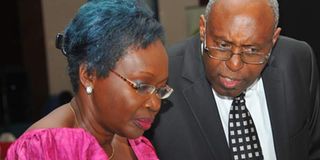Government advised to tap into capital markets resources

Capital Markets Authority CEO Japheth Katto (R) chats with Finance minister Maria Kiwanuka during the Kikonyogo Capital Markets Award dinner held at Kampala Serena Hotel last week. PHOTO BY FAISWAL KASIRYE
Kampala- Government should critically look at capital markets as a channel for mobilising capital to finance infrastructure development in the country, an investment expert has said.
Speaking at the 11th Kikonyogo Capital Markets Authority Award (KCMA) dinner in Kampala last week, Mr James Mworia, the Centum Investment Company chief executive officer, said the global capital markets are awash with liquidity that is seeking a home which offers “above inflation yields.”
Mr Mworia’s advice comes at a time when developing countries are facing limited inflows of long-term financing from donor countries in the wake of financial challenges.
This calls for seeking alternative sources of cheap long-term capital, which can be obtained from capital markets.
Most Ugandan companies seek short-term finance from commercial banks to finance long term development projects which is considered expensive, yet businesses can access cheap long-term funds from capital markets. This means that there is a mismatch between the available finance in the market and what the market needs.
On order to make it attractive for the private sector raise finances from capital markets, Mr Mworia advised that there is need to address challenges of low investor education, streamline rules to facilitate issuance of infrastructure debts, streamline regulation and reduce regulatory bottlenecks to ease the process of issuing infrastructure bonds.
“The rules in Uganda for the issuance of corporate debt instruments are not suited for infrastructure issuances,” Mr Mworia said.
He further urged the government to consider issuing infrastructure bonds and support high quality local private infrastructure projects to raise capital.
“There is an opportunity for Uganda to raise at least $150 million per year (about Shs375 billion) in long-term debt capital through the bond market and denominated in local currency to finance the debt tranche for the construction of a 100MW power projects each year,” he said.
He added: “If this is done each year for 10 years, that works out to 1,000MW of power and reduce the cost of power by eliminating the foreign currency adjustment component on at least 70 per cent of the tariff.”
Finance minister Maria Kiwanuka said government would not grant that because it has to raise revenue to finance huge infrastructure projects like roads, power and piped water.
[email protected]




